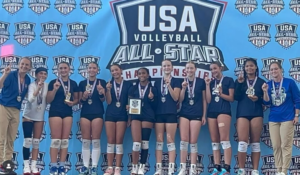Oklahoma Region
Ethics and Eligibility Policy and Procedures
The purpose of the following policy and procedures is to review complaints, policy infractions and incidents within the Oklahoma Region (“Region”). This shall be done with the utmost fairness, confidentiality and diligence. The Ethics and Eligibility (“E&E”) Committee and the Board of Directors (“BOD”) will follow due process and complete the review in a timely manner. All parties will be kept informed of the process by the designated committee chair, where applicable. The Region will apply Article X, section 3 and Addendum A of the By Laws for the Oklahoma Region. The Review Committee identified in Addendum A, shall be the same as the E&E Committee names in these procedures.
The Region promotes initiatives for safe, structured and fun life-long volleyball experiences. It is not a judicial entity. These policies and procedures have been created to protect and preserve the rights, privileges and integrity of the Region and its members and Region activities objectively and fairly.
Article I – Notification of Complaint
Upon receipt of a complaint by an individual, member or concerned party to the Region, either in writing, by email or orally to the Commissioner, which shall be followed up by the complainant in writing (absent evidence of a case of hardship in doing so). The Commissioner shall determine if the incident meets the standards to bring such complaint to the E&E Committee or if the matter is an Administrative Violation (as defined in Article II below).
If the result of the complaint is determined to be an Administrative Violation, the designated staff member will send an infraction notice to the club and/or member involved in the incident, in accordance with the progressive sanction scale outlined in Article III of this document. Any club and/or member receiving an infraction notice may appeal to the E&E Committee for review. Repeated administrative infractions may result in review for a Flagrant Violation.
If the infraction does warrant a complaint being brought to the E&E Committee by being determined as a Flagrant or Major Violation, the Commissioner shall notify the E&E Chairperson (“E&E Chair”). The E&E Chair will notify the respondent (the person being accused of breaking policy) and the other members of the Ethics & Eligibility Committee within five business days of receiving the infraction. This will be done in writing (electronically and/or via certified mail) and the E&E Chair, at their discretion, may telephone the respondent if it could be considered an urgent matter. The communication should include:
1. A summary of the complaint
2. Request for written acknowledgement of receipt of information, within five business days. If not received in writing, respondent’s membership may be placed on immediate hold pending acknowledgement and subsequent investigation.
3. A timeframe in which the respondent must respond to the infraction in writing to the E&E Committee. A statement may be taken over the phone; however, it must be followed by a written communication by the respondent. The committee shall inform the respondent of the necessary documentation needed for a complete investigation to occur.
4. A description of any immediate action (sanctions) taken, if any.
The E&E Committee must schedule a hearing 30 days before the next meeting of the Region’s Board of Directors. The E&E Committee has 20 working days after receiving all relevant information to complete the initial investigation and render a Decision Letter. If the respondent does not provide acknowledgement or written response to the infraction within the allotted time frame, the E&E Committee will render a decision based on the information gathered, acknowledging that the respondent chose not to provide additional information.
Article II – Types of Incidents / Complaints
These policies and procedures shall apply to matters involving alleged violations of codes of conduct or other polices created by the Region or Region BOD, USA Volleyball or any legal entity. Matters covered by the Region E&E process shall be divided into three categories:
1. Administrative Violations: These include but are not limited to minor and administrative violations of policies and procedures that do not involve harm to another person or entity or are non-threatening.
2. Flagrant Violations: These include but are not limited to repeated Administrative Violations, non-threatening violations of behavioral codes of conduct for the Region and/or USA Volleyball, spectator codes of conduct, facility rules, or any violations that occur at another Region’s event or a National event.
3. Major Violations: These include but are not limited to alleged conduct in major violation of behavioral codes (either published or societal), USA Volleyball or Region Codes of Ethics, Spectator Codes of Conduct, or legal infractions. Any alleged SafeSport conduct violations should be reported to SafeSport for further investigation by that body. A violation of law that involves the personal safety of athletes, staff or spectators should be reported to law enforcement.
Unless the physical or significant financial safety of Region members, any individual, or the Region itself is threatened, the subject of alleged wrongdoing shall be entitled to due process. If the conduct of the respondent is deemed a threat to emotional, mental, or physical well-being of others, the respondent may be suspended or removed from certain activities pending a completed investigation.
Article III – Sanctions
The E&E Committee shall determine the length of time for sanctions for the specific offense. Subsequent offenses within one year shall have additional sanctions imposed. That is, if you receive a letter of warning or probation, or a Decision Letter from the E&E Committee, it will be in effect for one year from the date of acknowledgement of the notification by the respondent.
Therefore, if there is another offense during that year period, it will be the second offense with escalated sanctions. The new year for the possible third offense begins from the acknowledgement of the second offense notification by the respondent. While not able to be used to escalate the offense number within the year period, any information and/or Decision Letters on prior violations may be used to establish a repeated history of violations throughout membership with the Region.
A third offense of a Flagrant Violation or a second offense of a Major Violation will result in an expulsion of more than five years, up to a lifetime ban.
Please note that the Region must accept and enforce any sanction passed down from USA Volleyball or the U.S. Center for SafeSport, and will refer to the E&E Committee for review any sanction passed on by another Region or another volleyball entity.
Sanctions can be combined (ex: a warning and a fine) and include, but are not limited to:
1. Warning (Staff and/or E&E Committee): Administrative or minor Flagrant Violation, admonition against a repeat violation.
a. Examples: Failure to pay team fees, tournament sanction fees, register as a club with necessary information. Making offers before the applicable tryout period.
Proof of badmouthing clubs, players, coaches, officials or individuals. Not adhering to safety precautions.
2. Fine (Staff and/or E&E Committee): Administrative or minor Flagrant Violation sanction for violation of a policy.
a. Examples: Missing an officiating assignment or playing assignment. Using players / coaches without the proper credentials (valid membership, background screen, SafeSport,
Impact, etc.).
3. Probation (E&E Committee): Decision for repeated Administrative Violations, or Flagrant Violation. Can include remediations such as volunteering or community service, apology letters, mandatory education to address infractions or other act of service to educate.
a. Examples: Repeated administrative violations. Violation of tryout or retention period policies. Knowingly playing a player down at an incorrect age level. Minor
violations of Codes of Conduct. Minor damage to a facility. Emotional harm to another individual not rising to the level of a SafeSport violation.
4. Suspension (E&E Committee): Decision for removal of respondent from participation in events, programs, activities for a specified period of time, up to one year from date of receipt Decision Letter by respondent (receipt of which shall be deemed to be three (3) days following mailing of Decision Letter). Can include remediations such as volunteering or community service, apology letters or other act of service to educate.
a. Examples: Further violations while on probation, having a club admin who is not safety screened, repeated or multiple administrative or flagrant complaints,
including regarding poor sportsmanship, mistreatment of athletes, coaches, referees or any other individual at a sanctioned event, any code of conduct
violation, including but not limited to bullying, harassment, sexual misconduct such as inappropriate jokes or materials distributed or shown to minors, or those
in a position of lesser power (official to work team, coach to player, coach to assistant coach), even if both are considered adults.
5. Expulsion (E&E Committee): Decision where membership is revoked and the individual is not allowed to participate in any sanctioned events. Depending on the severity of the offense and the number of offenses, participation could be limited for up to five years.
Examples: Violations such as sexual misconduct or abuse. Any action that does not rise to a SafeSport issue but is not consistent with USA Volleyball Codes of
Conduct.
6. Banned (E&E Committee): Decision where an individual is no longer allowed to participate or attend any sanctioned event. Can be applied to membership, or where
violations occur at a region-sanctioned event and involves a non-member. Examples: Major violations of Codes of Conduct, repeated or flagrant harassment of officials, coaches, players or other individuals at a sanctioned event that require police involvement, any felony involving misconduct against children or violence.
All sanctions will be documented in writing to the respondent, with a copy to the Commissioner and/or Region office for record keeping. All sanctions are subject to the appeal guidelines outlined in this policy and the due process procedures of the Region outlined in Exhibit A.
Article IV – Procedures for Violations
ADMINISTRATIVE VIOLATIONS
Upon receipt by the Region of notice of a possible violation of administrative procedures, the Commissioner or a designated staff member shall promptly investigate and take appropriate action, if any, as suggested by the facts, precedent, or published policies and procedures. Any such decision shall be communicated as soon as possible to the affected individual, team, or club in a Decision Letter as described below and transmitted by a form of verified delivery. Such writing shall describe the decision; the evidence considered; the code, policy, or procedure deemed violated; the action taken, if any; and procedure for appeal if desired. A copy of the Decision Letter shall be sent to the respondent and to the Commissioner and/or Region office for record keeping.
FLAGRANT / MAJOR VIOLATIONS
Upon receipt by the Region of notice of a possible flagrant or major violation, the Commissioner shall promptly send any and all relevant information, including but not limited to submitted information, contact information and any information on prior E&E matters, whether administrative or flagrant / major, to the E&E Chair of the Review Panel selected to hear the matter. If the E&E Chair or other member of the Review Panel has a conflict of interest, the next member of the Review Panel will be selected. The Chair shall provide prompt written notice of the allegation to potentially affected parties. The E&E committee then meet in person at least 30 days before the next regularly scheduled meeting of the Board of Directors.
The Review Panel shall determine the merits of the allegation by interviewing relevant witnesses and parties, including and especially the accused party, obtaining relevant documents, if any, and other relevant evidence and identifying relevant codes or policies, documenting everything in written format. The hearing shall be recorded and a copy of the hearing will be kept by the Region. The accused shall have the opportunity to present a response to the accusations.
The Review Committee can issue a decision at the conclusion of the hearing, or a written decision within five (5) days after the hearing is closed. Any such decision shall be communicated to the affected individual, team, or club in a Decision Letter as described below and transmitted by a form of verified delivery or email. Such writing shall describe the decision; the evidence considered; the code, policy, or procedure deemed violated; the sanction imposed; and procedure for appeal if desired. A copy of the Decision Letter shall be sent to the respondent and to the Commissioner and Region office for record keeping.
The E&E Committee may make an initial decision for any incident requiring immediate action, before an investigation is complete, or rising to the legal or SafeSport level where a full investigation is not allowed by Region staff or those involved in the E&E process. The respondent will follow the ruling until the E&E Committee completes the investigation or further action is given by law enforcement or the U.S. Center for SafeSport. These are serious or major offenses to region policy or federal, state and/or local laws. These generally involve considerations of safety such as child endangerment, child molestation or abuse, sexual harassment or abuse, violence, property damage and destruction, abuse or physical harm. In these instances, the Region may convey Interim Measures while law enforcement and the U.S. Center for SafeSport conduct an investigation. Interim Measures are temporary measures put inplace and will be fact-specific based upon the allegations, but may include temporary suspension
of membership and participation in specific or all Region events, pending resolution of any investigation.
DECISION LETTERS
The Commissioner or designated staff member (for Administrative Violations) or the E&E Chair (for Flagrant / Major Violations) shall prepare a letter to the accused party summarizing the following:
a. the allegation precipitating the matter;
b. the relevant policies and/or code sections respondent has allegedly violated:
c. the evidence considered;
d. the decision reached; and
e. the process for appeal in the event a sanction is imposed or requirements for return to participation are put in place.
Decisions shall be made within five (5) business days after a hearing is concluded, and letters to an accused party shall be prepared and transmitted by verified delivery.
Article V – Decision Appeals
Written appeals pertaining to a Decision Letter from the Review Panel can be appealed to the entire Board of Directors by forwarding a written notice of appeal to the Commissioner within 14 calendar days from the notice date of the Decision letter. For the purpose of hearing an appeal from a Review Panel, the BoD will be referred to as the Appeals Committee. The Appeal Notice should contain the reason for the appeal with supporting evidence. The Respondent cannot appeal a Decision Letter if they have not participated in the hearing before the Review Panel. The Commissioner will pass all relevant information on to the Appeals Committee. The BoD President (or designate, in case the BoD President has a conflict of interest), will serve as the chairman of the Appeals Committee.
The Appeals Committee promptly shall consider the appeal, materials submitted by the appealing party, materials submitted by the E&E Committee who made the initial decision, testimony requested by the appealing party or solicited by the Committee in pursuit of an objective review, and any other information or documentation sought by the Appeals Committee in such pursuit.
The Appeals Committee may hold an informal hearing at the convenience and request of the potentially affected party or may conduct electronic/telephonic conferences with instant and open communication and debate. If a hearing is requested, the appealing party shall be informed of the identity of any persons who will present live testimony. If testimony or statements have been provided in advance of a hearing, the appealing party shall have the right to review and respond to copies or summaries (e.g., of an oral statement) of the same. The Committee shall endeavor to reach a decision as soon as possible after collecting or receiving all reasonably available and pertinent evidence or following completion of a hearing. Witnesses need not swear oaths but shall be reminded of the need for truth and objectivity. In its decision, the Committee may accept, reduce, expand, or completely void the sanction originally imposed. The Committee’s determination shall be transmitted to the appealing party in the form of a Decision Letter as described above.
Appeal to the Region Board of Directors
Only the decision of an E&E Review Panel may be appealed to the full Board of Directors (Appeals Committee), but only for a determination of whether the appealing party received due process as described herein. A Board finding of inadequate due process and, (absent a violation of Region policies or procedures or a potential threat of physical, emotional, mental and/or financial harm to an individual, team, club, or the Region), shall void any sanction in effect. In such event and if the Board so determines, the matter may be remanded to an entirely new review for prompt reconsideration of the original appeal but only for the elements that were inadequate in the initial determination.
Final Appeal
In accordance with the USAV Bylaws, a party who has exhausted Region due process may appeal the Region’s decision to the Regional Volleyball Associations Assembly (“RVAA,” comprised of a principle representative from each of the 40 Regions of USAV) Chair and its Ethics & Eligibility Committee for a determination of whether the party received adequate dueprocess.
Appeal Timeline
The decision of an Administrative or Flagrant / Major Violation may be appealed by writing to the Executive Director within fourteen (14) calendar days after the date on the Decision Letter. The application of due process by the E&E Appeals Committee may be appealed to the Region Board of Directors by writing to the Executive Director within fourteen (14) calendar days after the date on the Decision Letter. The decision of the Board (unless remanded) may be appealed through USAV due process as provided in the USAV Bylaws.
Article VI – Miscellaneous Information
Conflicts of Interest: The actual or appearance of a conflict of interest by any individual involved in any level (whether staff member, Committee Chair or member or BOD member) must result in that individual declining appointment, resigning or being replaced for purposes of the relevant matter, including but not limited to, participating in the investigation (except to convey information to the committee) or being privy to any details surrounding the investigation, outcome or appeals.
Records: The records of any matter resulting in a sanction for a Flagrant/Major violation shall be preserved in electronic form for at least 10 years after expiration of a sanction and should be forwarded to the Commissioner and Region office for record keeping. Such records shall include all decisions rendered and all evidence received or reduced to document form. Intermediate communications and informal notes need not be preserved.
Timeliness: For the best interests of all parties, reasonable timeliness shall be a priority at all levels of consideration. All Flagrant / Major Violations should be finished within 25 business days, and all appeals need to be filed by respondent within 14 calendar days of notification of outcome.
Private matters: Region Ethics & Eligibility Policies and Procedures shall not apply to conflicts between clubs / teams and families / players concerning financial matters, playing time, club policies and procedures, or other matters not directly involving the Region, USAV, or their codes and policies.
EXHIBIT A – DUE PROCESS PROCEDURES
The Oklahoma Region Volleyball Association (OKRVA) is a Regional Volleyball Association (RVA) under the umbrella of USA Volleyball (USAV), and every member of USAV and the OKRVA must agree to the Volleyball Participant Code of Conduct. The OKRVA has the authority to impose sanctions and/or penalties, including expulsion, on Members violating OKRVA rules. The Member(s) sanctioned will have due process rights. Due Process involves the right of the accused to receive clear and timely notification of the accusations against them, to confront his/her accusers, to present his/her side of the story, to receive fair consideration and to have the opportunity to have the decision reconsidered by a separate authority. Member(s) will have the opportunity to appeal a decision in the event that a sanction or a penalty is imposed.
Section 1. Initial Notice. The initial notice of the accusation may be oral. Regardless of whether oral notification is given, written notice to the accused shall be provided via email or other written means within five (5) days of the alleged rules violation. In the event that a penalty or a sanction is imposed, notice of that penalty or sanction will be provided as soon as possible to the accused. Written notice shall be provided by email to the accused within 10 days of the issuance of the sanction or penalty. It is the Member’s responsibility to keep their USAV registration contact information current. The notice of penalty or sanction will include:
(A) Summary of the incident, including the date, time and location at which the incident allegedly occurred.
(B) Citation of the OKRVA rule that was allegedly violated.
(C) Description of the action or sanction taken.
(D) Statement that the individual has right to appeal the decision as set forth below.
Section 2. Appeal Process. Members can appeal a penalty or sanction directly to the Regional Commissioner; or to the Review Committee if the Regional Commissioner issued the penalty or sanction; or to the Board of Directors at their next regularly scheduled meeting. An
appeal must be initiated by emailing a notice of appeal to the officer hearing the appeal. The notice of appeal must be emailed within 14 days of the date the notice of penalty or sanction was provided to the Member(s).
Section 3. Review Committee. A Review Committee will be established by the OKRVA Board of Directors at each Annual Meeting. The ten (10) Review Committee members shall be selected from the Board of Directors. The Review Committee will be listed consecutively in order of service.
(A) Once a timely appeal is made, the first three (3) names on the Review Committee will comprise the Review Panel selected to hear the appeal. If one or more of these members are not able to sit on panel, then the next name on the list will be selected to sit on the panel, and so on and so forth until the Review Panel is comprised of three (3) members of the Review Committee. The Review Panel members will be selected on a rotating basis: For each subsequent valid appeal that is made, the next three Review Committee members on the list will be called to sit on the Review Panel.
Section 4. Review Panel Hearings.
(A) If possible, a hearing will be called and the Review Panel will meet in person no fewer than 30 days before the next regularly scheduled meeting of the Board of Directors.
(B) A reasonable alternative to this meeting would be a video conference.
(C) The Review Hearing will be recorded and a copy of the proceeding will be retained by the OKRVA.
(D) At the beginning of the hearing, the Commissioner or person that issued the penalty or sanction will present the accusation, the OKRVA rule that was allegedly violated, any evidence in support of the accusation’s validity, and the action taken.
(E) The accused will have an opportunity to present a response. The accused will also have the right to cross-examine any witnesses.
(F) The Review Panel has full authority to conduct the hearing and has authority over decisions concerning procedural matters.
Section 5. Review Panel Decisions.
(A) The Review Panel has the option to either make a decision after the evidence has been presented at the Review Hearing, or the Review Panel can adjourn and within five (5) days deliver its decision.
(B) Notice of the decision may be given by a phone call, but this must be followed up with an email stating the decision to the most recent email address on file with the USAV.
(C) Oral and written notice will include reasons for support, revocation or modification of the sanction, and notice that the decision of the Review Panel may be appealed to the entire Board of Directors within fourteen (14) days of written notice of the decision. Any appeal of the Board of Directors’ decision would go to the parent organization, according to their appellate procedures.
Section 6. Appeals to the Regional Commissioner. Appeals to the Regional Commissioner shall follow the procedures established above for Review Panel Hearings and Review Panel Decisions. Appeals of Regional Commissioner decisions may be made to the entire Board of Director if done so in writing and within fourteen (14) days of notice of the Regional Commissioner’s decision provided to the Member.










